From the Mouth of the Whale Read online
Page 10
The professor’s delight in his new amanuensis was such that he began to make plans for Jónas’s permanent residence in Copenhagen. After consultation with Reverend Pálmi Gudmundur, who had received a satisfactory verdict in his lawsuit and was now able to return to Iceland to take up the position of curate at Hjaltastadur, it was decided that instead of going home with his son, Jónas should send for his wife Sigrídur to come to Denmark. Jónas was sixty-three years old by now and she fifty-seven; he would help Worm translate ancient texts and draw objects from his collection when required; she meanwhile could assist in the kitchens. A decent private chamber would be found for them in the upper servants’ quarters and they would finally be allowed to live in peace after twenty years of being hounded from pillar to post. Jónas Pálmason’s breast swelled with hope: although he himself had not spent any time out of doors in Copenhagen, Sigga would enjoy the novelties on display; the fireworks, the court finery and the elegant buildings would be balsam to her weary eyes.
On the May evening when he and Rector Worm shook hands on the plan, Jónas took from his pouch a small, dice-shaped box of seal-bone which contained his rarest possession, a blood-black crystal, yellow at the edges, which was at once a work of nature and a holy mystery. It was a kidney stone that had become trapped in Bishop Gudbrandur Thorláksson of Hólar’s private member, which Jónas had with his own hand removed from said member according to the instructions preserved in the saga of the medieval doctor, Hrafn Sveinbjarnarson. Having split the penis like an uncooked sausage, he picked the stones out of the urinary tract before sewing the whole thing up again. The cleric’s stone-afflicted body had given birth to three crystals, one of which Jónas had quietly pocketed and kept by him ever since. The bishop’s gratitude had secured Pálmi Gudmundur a place at the school of divinity in Hólar (with the help of a document in Jónas’s possession which proved that the bishop’s son-in-law, Ari Magnússon of Ögur, had violated the king’s law). Now, however, Jónas made a gift of the kidney stone to his friend Ole Worm in return for providing a roof over his and Sigrídur’s heads.
The following day a handwritten sealed writ arrived from His Majesty King Christian IV, in which the king concurred with the University Council’s verdict that Jónas Pálmason was not a practitioner of the black arts. Instead of acquitting him unconditionally, however, His Majesty referred the case to the court of the Althing at Thingvellir in Iceland and bade the Icelanders themselves formally revoke the sentence in the presence of the defendant.
Jónas the Learned was going home.
III
(Winter Solstice, 1637)
Evening has fallen on the shortest day of the year and, dear God, the longest night lies ahead. How many hours of light did I get? Two? Three? One? It was a dismal day, after a bad beginning. When morning finally came I was cheated of what meagre share of daylight I could hope for. Thick banks of cloud hung over the island, as low as could be, tinged black at the crown; a heavy, merciless weight, shedding neither rain nor snow. The dreariest kind of clouds, which drain one of vigour, clamping their iron-grey fists around one’s skull, digging their talons deep into eyes and ears, forcing them into mouth and nose in an attempt to fill one’s head with grey sleet, to burst it from within and crush it from without. With effortless strength they depress one’s humour into the coldest wells of thought and imprison it there, but unlike the cloud of smoke that drives occupants of a burning house to the floor in the hope of snatching a breath of life-giving air, nothing awaits one at the bottom of that pit of despair but a mouthful of acrid yellow gall. There is no gleam of hope, no mercy to be found on this frozen tundra; the ground is as hard as stone underfoot, the frost reaches down to the very bedrock. The sea has frozen halfway from the island to the mainland and the ice is stained a dirty black following the sandstorm at Martinmas. Not that I can see the shore, for the mountains are as dark as the sky – assuming they are still there. What do I know? Damn the mountains. Above them hangs a pall of black gloom, like the lid of a narrow iron casket. So this day began, and it only grew worse. When the tangle of clouds finally began to unravel it was not the sun that appeared from behind them, no, it was the feeble glimmer of the moon. Was I supposed to be grateful? After all, light is light, is it not? Ah no, the cold moonlight was nothing but a bitter reminder of what I was missing: the winter sun. Her weak rays may lack the power to disperse the sea ice, waken the growing things in the soil or inspire the bunting to sing, yet even so her pallid face fills one’s breast with faith in her ability to do these very things. A faith that warms the cockles of one’s heart. Even more than the sunlight itself, it was this spark of hope that was denied to me. It was not as if I needed strong light to perform the chores that awaited me when I crawled out of my lair at noon; for those, even the moon’s sullen grin was superfluous. What need had I to venture outside in the loathsome winter weather? Well, to empty my chamber pot of its paltry contents that had frozen solid in the night. Where little goes in, little comes out: no more than two droppings in this case, congealed in a single splash of piss. There are many reasons for this: firstly, I am such an old wreck nowadays that my bowels have become sluggish; secondly, in recent weeks the weather has been so stormy that I do not leave the hut unless it is unavoidable, and as I hardly move at all, I need less food; and thirdly, I have scarcely anything left to eat. And I have nothing with which to counter any of this: old age, the time of year or dearth of food. The sheet of ice has its beginning halfway down the beach and surrounds the whole island with its sudden creaks and eerie groans, pleated like one of the Lord Chief Justice’s starched ruffs. On the beach all life has been scorched by the cold; the sand is as hard as stone, the seaweed withered. Haddock and cod lie under the furthest rim of the ice, if they have not frozen to death too, but I have neither the strength nor the nerve to go out there, lacking a boat. What would I do there anyway? Talk the fish up through the ice? I have little fishing tackle and am too frail to hack a hole in the ice for my line. There is nothing here for the gulls but the boulders on which they rest before resuming their search for food with feeble flaps of their wings and famished cries. Even if I had a piece of string to snare them with, I do not have any bait for my trap apart from the flesh on my own bones, because I am not going to start feeding scavengers from my scanty stores – all I have left to last me till spring is a bundle of dried trout, some soup bones, a bunch of dried dulse, half a bag of flour, the butter that has not yet been scraped off the sides of the barrel – and I hardly think it would be wise to habituate the gulls to the taste of myself. Not that such a thing would be necessary; I expect Master and Mistress Seamew already have plans to feast on my corpse if I freeze to death on one of my trips to empty my piss pot. Well, if that is how my life is to end, the pickings will make a meaner banquet than the gulls anticipate: I wish them good cheer. But the worst was still to come; this brutal day had yet to play its cruellest trick; God in His wisdom had resolved to test me still further. I had just started to chip away at the contents of my piss pot when I noticed that the moon seemed to have changed shape: its left-hand side was dented, like a cheek yielding before Famine’s spectral finger. At first I assumed the heavy clouds were closing in on it again, and thought it a damned shame that they would not leave it to hang there in peace, but on closer inspection I noticed that the clouds had, if anything, thinned. I carried on banging the pot on a rock. Although there was little in it, I had to be careful not to bang it too hard as the wooden strakes had been eaten away by the urine and I could not afford to break it. Against the background of that hollow banging I watched as a quarter of the moon was gnawed away. Fear and trembling! Through my winter lethargy I grasped what was happening: a lunar eclipse. The moon, the only source of light meanly allotted to me in my solitary state on this gloomiest day of the year, was darkening. Behind me the sun crept as furtively as a fox beneath the rim of the horizon, casting the Earth’s shadow over her wretched brother. In doing so she put us both in our place, reminding the moon
that without her he was nothing but a dreary, lightless mountain of basalt, and ordering the beggar Jónas Pálmason to clear off back inside his hovel. Insignificant humans were not welcome at the heavenly bodies’ cheerless family farce. If I stood there one minute longer with my nose pointing at the darkened moon, I would drop dead on the spot and be found in spring, lying there lifeless with my rigid hands still clamped round the piss pot. I saw now that this day no longer deserved the name; it would be better to tear it out of the calendar and file it where it belonged between the pages of Satan’s black book as ‘Night’. Obeying the command of the wrathful sun, I hastened inside, barred the door, crawled into the kitchen, put the chamber pot by the bed and lay down, pulling up the blanket and making the sign of the cross. And here I lie still. Oh, is it not just and true what those foreign mountebanks write in their many widely read travel accounts about the vileness and absurdity of Iceland, this condemned island of the dead – however much her educated citizens may revile and rant at them? Old Arngrímur Jónsson blew raspberries at such accounts in two books, both of which found their way into print; in one he included a portrait of himself, in the other a fine drawing of a monkey. Bishop Oddur Einarsson also compiled a book, of which copies can be found here and there, though minus illustrations; and Bishop Gísli, Oddur’s son, has two small pamphlets in the making, although there is little enthusiasm for them. I have not read any of these counterblasts, for they are all in Latin, which I do not know, but I have no doubt they play fast and loose with the truth, being at the same time tediously written and dull to read, since none of these three is to the popular taste or known for his poetic skills. On the other hand, various titbits from the controversial travellers’ tales have been passed on to me, though I have not seen any of them myself since the lords of our land place them on a par with murder. But even from these scraps I can tell that although, naturally, they get most things wrong, tell many lies, exaggerate and fill in the blanks with fantasy – indeed, wise men tell me that it is evident from their works that scarcely a man of them has ever set foot in this country – nevertheless one fact stands out from all their foolish nonsense: they come close to the truth when they state that Iceland is no paradise in winter: on the contrary, it is hell. The Englishman Thomas Nashe apparently says in his Terrors of the Night: ‘Admirable (above the rest) are the incomprehensible wonders of the bottomless Lake Vetter, over which no fowl flies but is frozen to death, nor any man passeth but he is senselessly benumbed like a statue of marble.’ Of course there is no lake in Iceland called ‘Vetter’, and there is precious little admirable about these horrors, and whether some of our larger lakes are bottomless I would not like to say. But what the foreign gentleman manages better than I, or any of my highly educated countrymen, is to describe the bitter helplessness and numbness I feel on this midwinter’s day on the Corpse Strand, far from the sun. I know it, I am there. And so it is with all the far-fetched tales that wind up the Arngrímurs of this world with their uncouth exclamations about endless nights, burning snow, whales the size of mountains, trumpet blasts of the dead from volcanoes and icebergs, witches who can sell sailors a favourable wind or send their sons to the moon; in some strange way they come close to the stories that we ordinary, humble folk tell ourselves in an attempt to comprehend our existence here and make it more bearable. Now that I give it more thought, how do I know that there are no lakes here like those described by Master Nashe? None of Iceland’s leading men were willing to pay me to explore this land; they turned a deaf ear to the news I gathered about silver sand, veins of gold and nests of gems. No, they are too busy growing rich on what this libertine Earth has to offer, passing corrupt judgements, hindering honest men from supporting their offspring, breaking up their families, cutting off their fingers and ears. In the same passage in Gentleman Thomas’s book we can read: ‘It is reported that the Pope long since gave them a dispensation to receive the sacrament in ale, insomuch as for their incessant frosts there, no wine but was turned to emayle as soon as ever it came amongst them’, and also ‘they have ale that they carry in their pockets like glue, and ever when they would drink, they set it on the fire and melt it.’ He who is omniscient knows that in this miserable hour it would be a comfort to me to be able to reach into my pocket and fetch out a beakerful of warm, consoling ale. But here, alas, old Tommy is telling a flat lie.
WHITE WHALE: from this creature is derived the proverb that ‘the white whale seldom fails on the fishing grounds’, for it is considered very wise and can often be found near fishermen, although it hides itself from view and rarely breaks the surface. The story goes that once all the crew but one were asleep on a shark-fishing vessel when a white whale surfaced and stayed beside the ship. The vigilant man reacted quickly and struck it with a club. When the rest of the crew awoke, they warned that he could expect retaliation, and heeding their warning, the man took to the hills. He stayed away from the sea for thirteen years. But at the end of that time, believing the white whale to be dead, he returned to the same fishing ground. A white whale appeared at once and seized him alone from the ship, and neither fish nor man was ever seen again. This is the origin of the saying about a man with a long memory: ‘he holds a grudge longer than a white whale’.
The kitchen is the smallest room in the hut; it is easiest to keep warm in here – if one can call it easy, or warm, for that matter. To fit the bed in here I had to pull the frame off the doorways between hall and living room, and between kitchen and hall. I did not replace the frames: they went on the fire. This is poor workmanship, I know – the hut will fall in on my head – but I needed the warmth after all my efforts. The kitchen doorway proving still too narrow, I had to break the legs off the bed in order to manhandle it through at a slant, and once it was inside I found it impossible to replace them, so I burnt them too. And since the base of the bed frame proved too long for the kitchen, I had to prop it up against the wall to the right of the door and jam the other end hard against the stones of the hearth. As a result, my bed tilts rather, meaning either my head is halfway up the wall and my feet by the hearth, or else my feet are up and my head is down, so when the pot is on the fire either my head boils and my feet freeze, or vice versa. I am continually turning round in bed, spinning back and forth like a top, which does my rheumatism no good at all. Thus I huddle by the hearth like a stay-at-home hero, edited out of my own story, too thoroughly buried and forgotten to be called on to perform unexpected feats of courage in a far-off kingdom. Yet I proved a useful guest in the realm of that busy monarch, Christian IV. Last summer I returned from Denmark in triumph, bearing a royal writ signed by His Majesty’s own hand and witnessed by many long-tailed seals, in which he enjoined his subjects, my countrymen, to accede to his wishes and revoke the foolish, brutal sentence they had passed on me at their libertine court in the mud of Thingvellir in 1631. With his own hand he had attached to his letter a sincere recommendation by the most learned men in the Danish realm, who had subjected me to a whole day of the strictest interrogation under the guidance of their rector and most erudite principal, Ole Worm. That throng of luminaries had gathered in the University Council known as the Consistorium, which for the infallibility and fairness of its judgements is respected and admired by all the nobles of that land, and thus these most skilled practitioners in the art of learning confirmed that Jónas Pálmason of Strandir had done nothing more heinous than compile an anthology of harmless ancient lore, of uneven quality to be sure, as with any human endeavour, and most of it outmoded, but the man himself far from being a sorcerer was a curious and diligent scholar of the arts of the mind and hand, although unschooled. Clutching this fine testimonial and the writ signed by the king, I boarded ship at Copenhagen last spring, confident that once home on Icelandic soil I could expect justice to be restored. But my happiness proved short-lived, for among my fellow passengers were the emissaries of that slanderous forked tongue that had so softly licked the ears of certain men in Denmark the autumn before and had me thrown in ga
ol. Their ringleader was the nephew of Sheriff Ari Magnússon, easily recognised by the family trait, a birthmark at the corner of his left eye. These little vipers won over the young captain who had been commissioned to carry me home, tricking him into believing that I was to blame for the winds that stirred up the sea and drove huge waves at his ship. They worked so well on his simple soul that when we reached the coast of Iceland near Rosmhvalsnes and sea devils, ratfish, malign mermen and other monsters raised a six-day storm that prevented us from going either forward or back, the captain, in the belief that I was stirring up the sea by sorcery, ordered his crew to throw me overboard. But no sooner had they dragged me up on the gunwale than the storm abruptly subsided, so there was no need to drown me on that occasion. After this the poor merchant and his crew were more convinced than ever that I was a sorcerer, but so in awe were they of my powers that I was left in peace for the remaining two days of the voyage. Naturally, it did not occur to any of them that blessed Providence might have intervened to save them from killing an innocent man. The vipers, meanwhile, slithered in among the coils of rope on deck and lay low until we reached land. The merchant vessel had barely cast anchor in Hafnarfjord before the slander-mongers put out a boat and rowed to shore. This did not bode well. Before I knew it, the governor’s executioner was being ferried out to the ship, accompanied by a second man and a neck iron, with the obvious intention of arresting me. I fled the executioner by swarming up the mast, from where I yelled that I would rather jump in the sea than set foot in my native land in chains. At which point it transpired that those same crew members who had been most eager to throw me overboard now wished by all means to prevent me from drowning of my own accord. Taking courage from the presence of the executioner, they chased me up the mast, dragged me down on deck and held me fast while he clamped the iron round my neck. And so I went ashore chained like a savage dog, which was a fitting preliminary to the brutal treatment that my tormenters had in store for me: they clapped me in irons, tied me backwards on an ancient mare and made me ride in front so that whenever we approached a farm on our way to Thingvellir the dogs would get wind of me first and run barking and baying around the mare, to be followed by a pack of crowing urchins and adults who abused me with ignorant insults and cat calls. Yet none of them knew of what crime the alleged felon was accused. When we reached court, the judges flouted the royal request, ignored the University Council’s words and confirmed their former sentence of outlawry. What made it all the more poignant for me was that the judges called themselves king’s men, a number were divines and others professed themselves Christians, and many of them had on their travels to Copenhagen been generously received at the home of the hospitable Worm and continued to enjoy his kindness after their return to Iceland. I had with my own eyes seen how these false friends plagued the learned doctor with letters importuning him to acquire for them all kinds of perishable items, from aqua vitae to Sunday breeches, or to mention their name at court, or to provide medical advice for their own or their mothers-in-law’s haemorrhoids, their wives’ tooth-ache and their children’s constipation – all of which ailments stemmed from the attempts of these homespun ‘aristocrats’ to ape the lifestyle of court in the Icelandic countryside, with the attendant idleness, intemperance and indulgence in sweet-meats in the Danish fashion. It was not enough that they required him to turn a blind eye to the indolence of their sons who were supposed to be studying at the university – the funds that were wasted on paying for those oafish gallants’ carousing and unheard-of extravagance in clothes would have been better spent if the Church could have commandeered them for the herd of barefoot beggars who were daily turned away from the kitchen doors at the childhood homes of these finely tricked-out drunkards – no, as if that were not enough, the most importunate among these petitioners actually expected Master Worm to take the time to compose obituary poems for them, though to lighten his burden they themselves provided the praise. In return for his trouble they sent him old books, healing stones and natural objects that seldom arrived in one piece: maggoty bird skins, rotten skates, shells and eggs in a thousand fragments, and stones of invisibility, clumsily faked. Preceptor Worm and I used to make fun of all this rubbish when I visited him, laughing aloud, the university man and the poet. Yet he put up with this one-sided trade with the Icelanders because just occasionally they would by accident send him something of value, such as the gaming piece of whale ivory, pretty old and decently carved, which is not surprising since it was a gift from that worthy fellow Magnús Ólafsson of Laufás. Although Ole Worm’s treacherous correspondents included honest men, like my Laufás kinsmen, none of this better group was among the judges who treated me so scandalously for a second time. If anything, their hatred was even more venomous than before as they were smarting over the fact that the University Council’s verdict declared in effect that their judgement of me had been ill-founded and deserved to be thrown out. Moreover, my friendship with the learned doctor had filled their hearts with envy and fear that I would tell him the truth about them: like the prankster who pisses on the calves after being flogged for throwing stones at the cows, they chose to compound their disgrace. Thus they reinforced my sentence by adding a clause that until someone was willing to give me passage abroad, I was to languish in irons in the dungeon at the governor’s residence in Bessastadir, in the full knowledge that no captain would be found for that passage any more than last time and I would have to end my days in the black hole, a prospect they found sweet. There I relived my nightmare of six years earlier, though now there was no Brynjólfur Sveinsson with his gentle touch. To the accompaniment of mocking jeers from the crowd I was tied on the mare’s back again and the executioner was just about to strike her when his master, the governor’s deputy Jens Söffrinson, steward of Bessastadir, called for silence. He beseeched the court to show mercy and spare him the burden of housing an ugly customer like Jónas Pálmason. The deputy’s words led to a good deal of tittering and sniggering, with accompanying hand gestures, head-tossing and tutting. However, once everyone had remembered their hands and wiped the froth from their lips, they acceded to his request and back I was sent to this island.

 The Blue Fox: A Novel
The Blue Fox: A Novel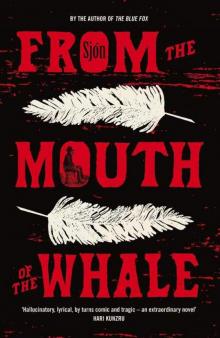 From the Mouth of the Whale
From the Mouth of the Whale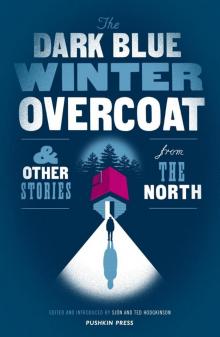 The Dark Blue Winter Overcoat and Other Stories from the North
The Dark Blue Winter Overcoat and Other Stories from the North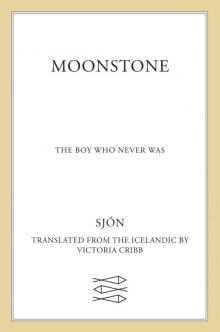 Moonstone
Moonstone CoDex 1962
CoDex 1962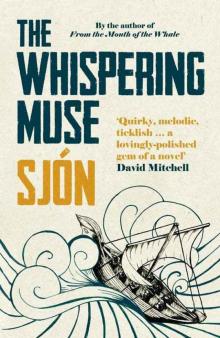 The Whispering Muse: A Novel
The Whispering Muse: A Novel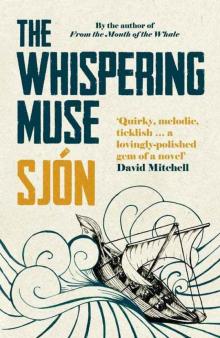 The Whispering Muse
The Whispering Muse The Blue Fox
The Blue Fox